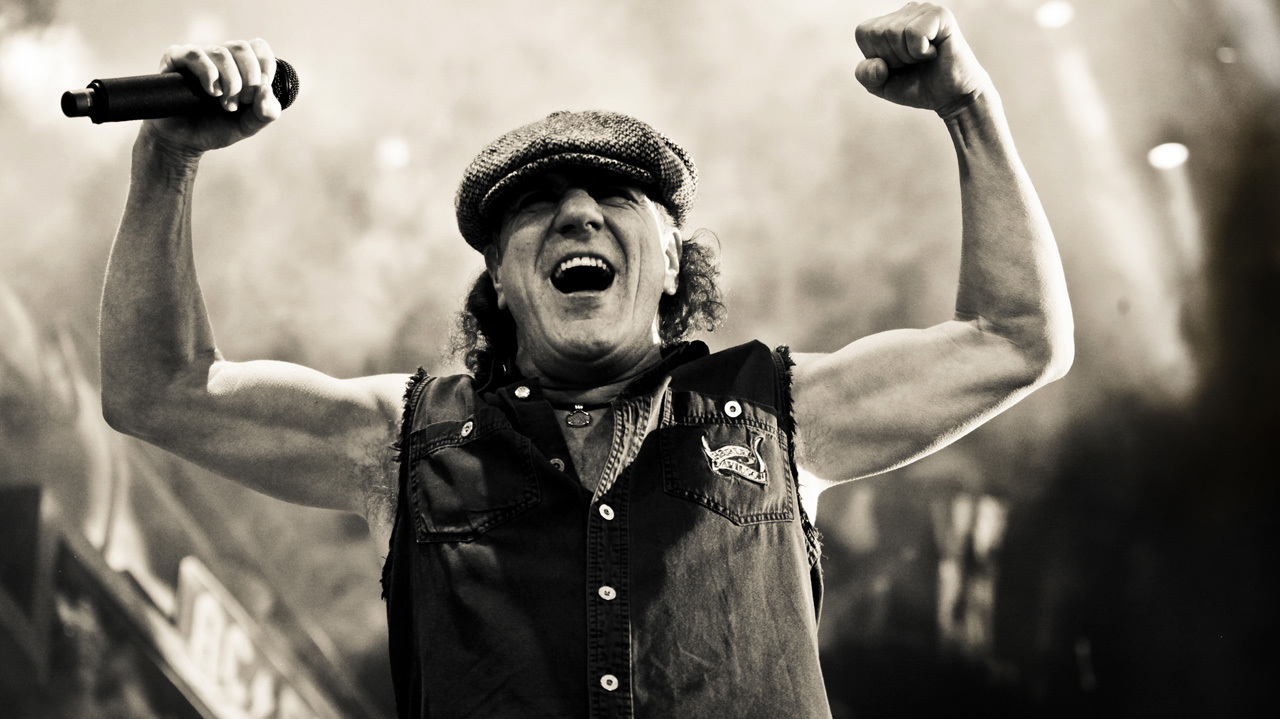Ian Jeffery was worried. AC/DC’s normally unflappable tour manager had been tasked with co-ordinating auditions to find the band a new vocalist following the tragic death of Bon Scott, and he was all too aware of Malcolm and Angus Young’s mounting frustration as one singer after another left London’s Vanilla Studios without having made an impression. Heavy Metal Kids frontman Gary Holton, Back Street Crawler vocalist Terry Slesser and former Rick Wakeman sideman Gary Pickford-Hopkins had seemed like promising options, but in the spartan Pimlico rehearsal facility where The Clash had written their London Calling album the previous year, each of those singer’s limitations had been harshly exposed.
Replacing the charismatic, cocksure Scott was never going to be an easy task. But as each name on AC/DC manager Peter Mensch’s shortlist was systematically scored out, Jeffery began to question whether the Young brothers’ heads and hearts were truly in this process – entirely understandable given that they’d laid their friend to rest in Freemantle just three weeks previously. To add insult to injury, it was starting to look like the next candidate hadn’t even bothered to turn up.
A couple of AC/DC roadies were playing pool with a stranger in Vanilla’s recreation room when Jeffery walked in. “How’s it going?” one asked. “We’re still waiting for this guy Brian to come,” Jeffery replied.
“Brian?” the stranger asked, in a thick Geordie accent. “I’m fucking Brian!”
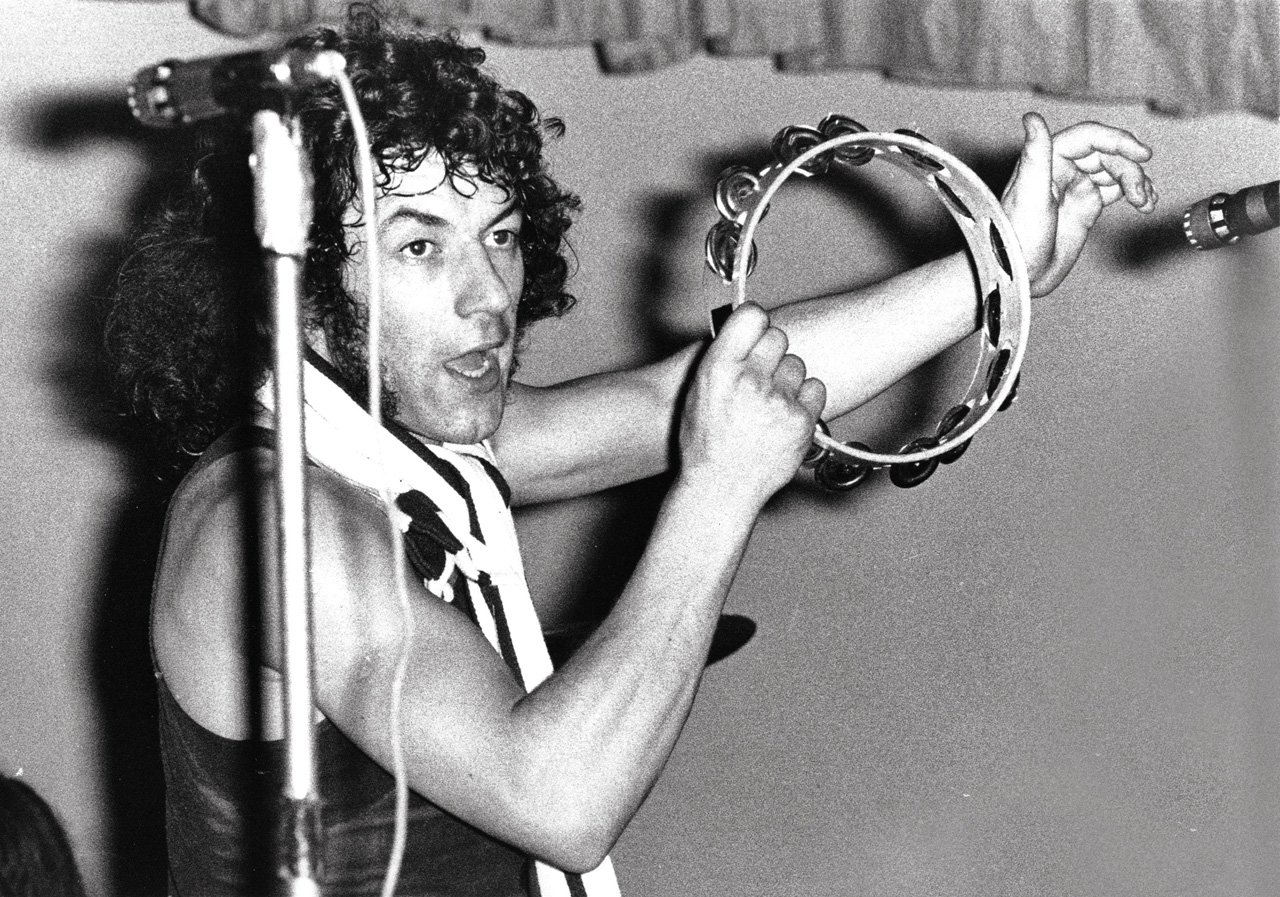
In fairness to Jeffery, it had been some years since anyone had paid much attention to Brian Johnson. A car roofer and former paratrooper, the 32-year-old from Gateshead had enjoyed a fleeting moment in the spotlight in the early 70s when his glam-rock band Geordie enjoyed some minor chart success. But at the dawn of the 1980s, the singer was the only original member, dragging the band around the northern Working Men’s Club circuit. By his own brutally frank assessment, Johnson had “passed my sell-by date”.
Still, a try-out in the Big Smoke with a band now gracing the front covers of Sounds and Melody Maker would make a good story for the lads back home. “I thought: ‘What harm can it do to sing a few songs with them?’” he said later.
Johnson had been on his way to work at Top Match car roofing on the morning of February 20, 1980 when he read in the Daily Mail that Bon Scott had died the previous day. He’d hung out with the likable, livewire Aussie briefly in 1973, when Scott’s band Fang had supported Geordie at a pair of shows in Plymouth and Torquay, and had observed the singer’s rise to stardom with some admiration, so he was “disgusted” to see his old pal’s death merited only “two fucking inches” in the newspaper that winter morning.
Upstairs at Vanilla, he offered condolences to Scott’s bandmates, and received a bottle of Newcastle Brown Ale in return from Malcolm Young. Asked to pick a couple of songs to perform with the band, Johnson chose Ike & Tina Turner’s Nutbush City Limits and AC/DC’s own Whole Lotta Rosie, both staples of Geordie’s club-circuit set-list. Fifteen minutes later he was back out in the street, oblivious to the positive nods and smiles being exchanged by the Young brothers, bassist Cliff Williams and drummer Phil Rudd, but happy with his day’s work.
“I swore I’d never get bitten by the rock’n’roll bug again,” he later mused. “But these guys shook the shit out of me. I got goosebumps like I’d never had before.”
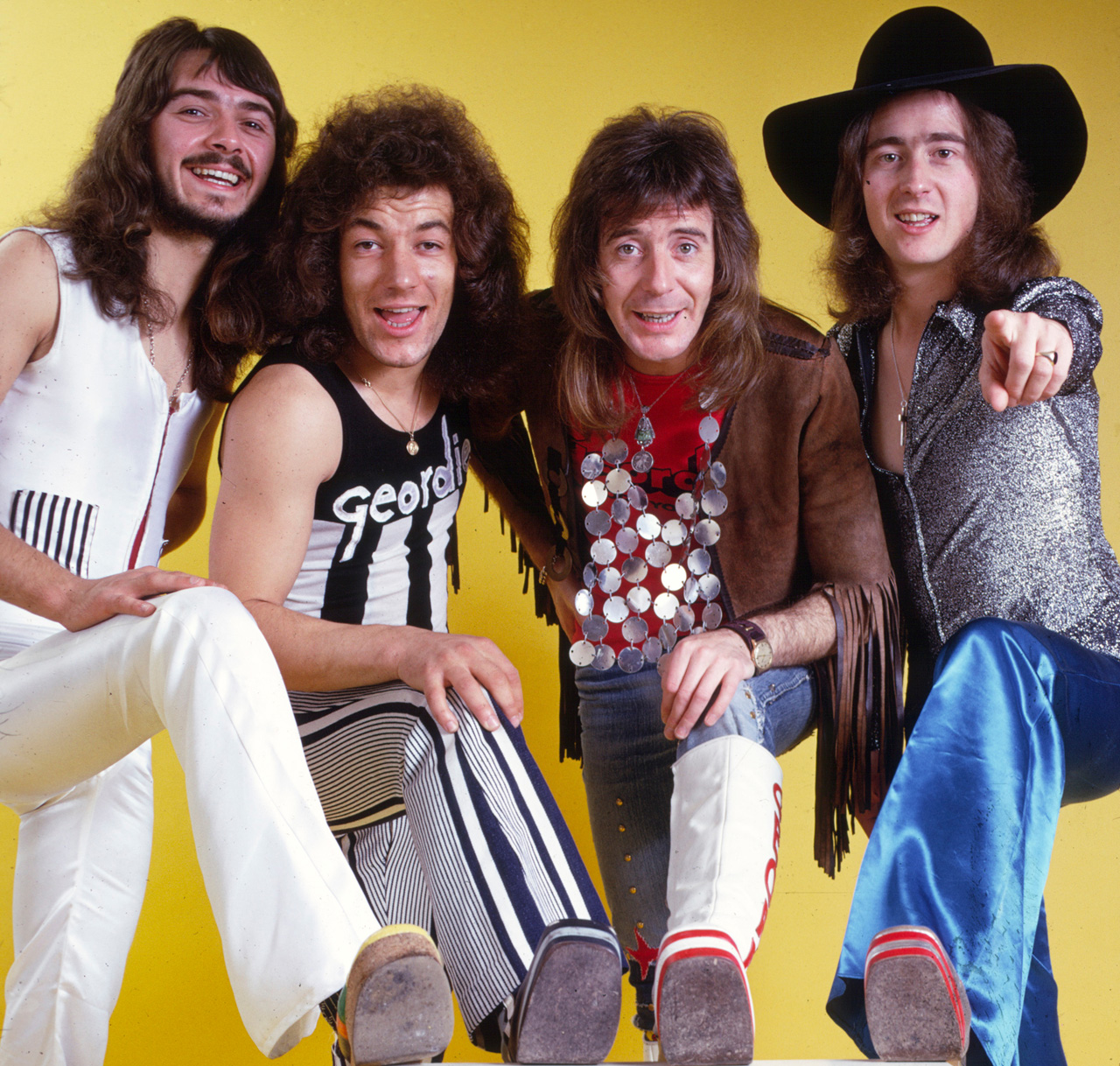
Brian Johnson was born in Dunston, Gateshead, on the south bank of the River Tyne, on October 5, 1947. His father, Alan, who as a soldier had fought in Africa and Italy in World War II, took a job as a miner upon his return to Blighty. His mother, Esther, was born in Frascati, Italy. A confident, outgoing child, young Brian threw himself into amateur-dramatics theatre productions and sang in his school choir, and developed an interest in performing. Soon enough, in common with so many teenagers growing up in the late 1950s, he fell under the spell of American rock’n’roll. Although the family didn’t own a record player, he vividly recalls seeing Little Richard for the first time on TV and remembers that “it was like someone had thrown a hand grenade into the room”.
At the age of 15 Johnson began gigging locally with the curiously named, short-lived The Gobi Desert Canoe Club, becoming a singer by default as he didn’t have the money to buy a guitar or drum set. When this most casual of collectives dissolved, the ambitious teenager cast his net further afield, and assembled South Shields-born guitarist Vic Malcolm and a Gateshead duo of bassist Tom Hill and drummer Brian Gibson – young musicians with an equal hunger and drive to break out from the North-East circuit – for a new group he called USA. Given that the fledgling group chose their name as indicative of their desire to transcend a local scene they considered insular and parochial, it was somewhat ironic that the first London record label to come sniffing around their high-energy, hooligan stomp insisted that the four-piece play up to regional pride and renamed themselves Geordie.
Sounds magazine may have been rather brutal in dubbing Geordie “rampant Slade imitators”, but with Johnson’s rasping, hoarse vocals on top of a pounding beat and Vic Malcolm’s thick, chunky riffage it is difficult to take issue entirely with the band’s debt to Noddy Holder’s boot-boys. The comparison was certainly apt when applied to Geordie’s punchy debut single Don’t Do That, which broke into the UK Top 40 in December 1972 and garnered the young Johnson an opportunity to perform on the nation’s premier music programme, Top of The Pops. A London show at the legendary Marquee club also put the group on the radar of the capital’s music ‘inkies, with New Musical Express reviewer Tony Tyler singling out Johnson as “the strongest character on stage”, and praising his “looks and zaniness” as key factors in the band winning over a tough London audience. The strong review undoubtedly played a part in securing London support slots with the Velvet Underground and Slade, and a first overseas trip for the Geordie, supporting Chuck Berry.
The band started 1973 high on confidence, buoyed by strong reviews for their debut album Hope You Like It. Hailing it as “a very likable album indeed”, Phonograph Record reviewer Ken Barnes noted: “Geordie is definitely a band to keep an eye on; you won’t spot anything new but you’ll like what you see.” When the album’s second single, All Because Of You, crashed into the Top 10 at the tail end of March, they made a second appearance on Top Of The Pops, and came to the attention of The Who’s Roger Daltrey who promised them studio time to refine their raw, combustible chops.
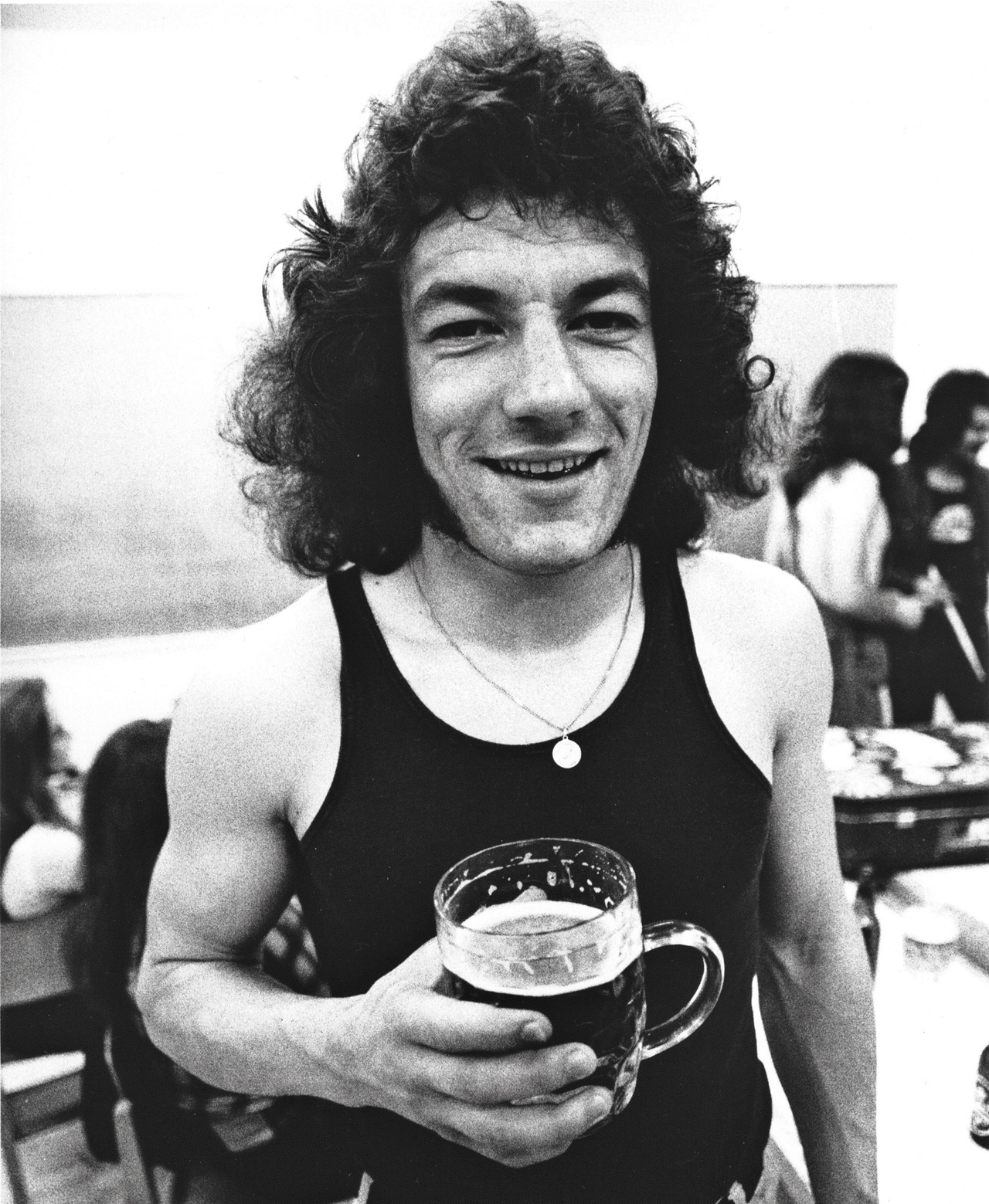
The following month Geordie played the two gigs with Fang, an Australian group formed from the ashes of the Bon Scott-fronted Fraternity. The Torquay gig would prove to be a memorable one for both singers.
“I had a terrible case of appendicitis, and I went down on my side, kicking and going: ‘Ooh!’” Johnson recalled. “But I kept on singing. Apparently Bon told the boys when he joined AC/DC: ‘I saw this guy Brian Johnson sing, and he was great. He was on the floor, kicking and screaming – what an act!’ Of course, it wasn’t an act. I was really ill!”
The following month, Geordie returned to their native North-East and played a sold-out headline show at Newcastle’s famous Mayfair club, and received another glowing NME review: “It’s like they just walked off a factory floor,” marvelled reviewer James Johnson (presumably no relation). “Geordie are loud and crass and very straightforward. What they have going for them is an incredible rough energy.” This, however, would prove to be the band’s high-water mark.
It’s difficult to pin down exactly why the anticipated breakthrough didn’t happen for Geordie. Though the band’s third single, Can You Do It, pierced the Top 20 in June, indications of audience affections cooling were telegraphed when its follow-up, the raunchy but warm-hearted Electric Lady – penned by Malcolm in honour of his fiancee Cecilie D’Ambrosie – scraped into the Top 40 at No.32 in August ’73. But with the quartet due back in the studio in October to record a second album, Brian Johnson was confident that his group had momentum.
An energy-sapping, and ill-fated, six-week tour of Australia in early 1974 was a mis-step, however, and by the time their second album, Don’t Be Fooled By The Name, was released in April, it was quickly evident that their audience had moved elsewhere.
Main songwriter Viv Malcolm bailed early in 1975, and by the summer of ’75, Johnson too walked, disillusioned and frustrated with record company expectations and fan demands alike. When he took up an offer of work from his brother’s car-roofing company, Johnson’s idea of following in the footsteps of local heroes The Animals and getting ‘out of this place’ seemed like a cruel and unamusing joke.
“I was completely broke,” he acknowledged. “I had nothing. And I had two kids and a mortgage to pay. I was driving a VW Beetle that was fourteen years old. I was fucking skint.”
And then came a call informing Johnson that he’d been recommended as a potential singer for a rock’n’roll band who were currently holding auditions in London…
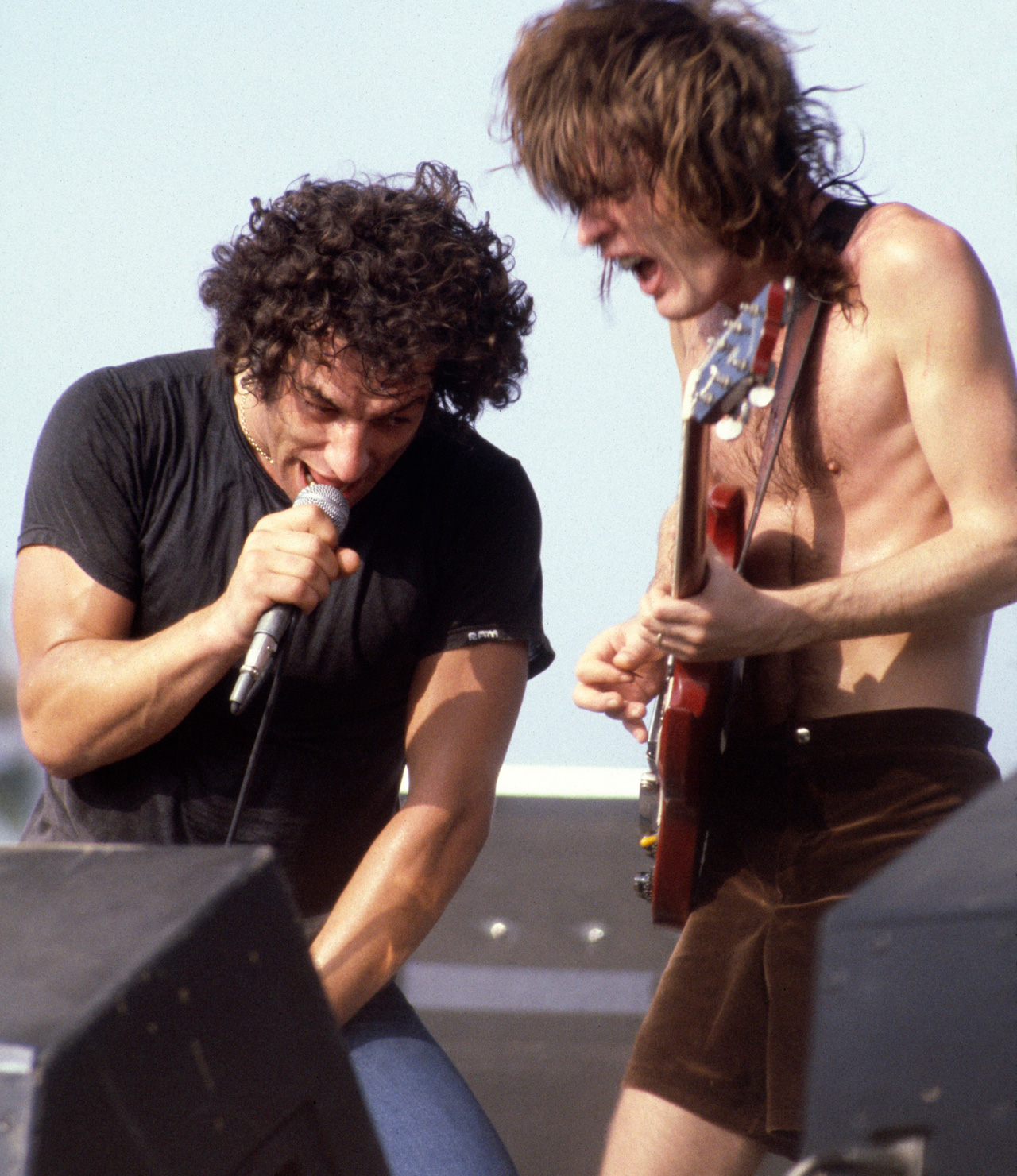
The official announcement that Brian Johnson was to be the new singer of AC/DC was made on April 1, 1980. Johnson had received the news in a phone call from Malcolm Young three days earlier at his parents’ home in Gateshead, where he was living following the break-up of his marriage to his first wife, Carol. As a divorced father-of-two still paying the mortgage on his marital home, Young’s offer of a £5,000 ‘signing on’ fee, a retainer of £170 a week and the offer of a new car must have been music to Johnson’s ears.
That same morning, he had read in the New Musical Express that Allan Fryer from Adelaide hard rockers Fat Lip had been chosen to fill Scott’s shoes – fake news dismissed as “bullshit” by the straight-talking Young. But it is perhaps forgivable that after speaking to AC/DC’s rhythm guitarist, Johnson subsequently necked half of the bottle of whisky he’d been planning to give to his father that afternoon for his birthday.
Within the week, Johnson had moved down to London to join the band at E-Zee Hire studios to begin writing the follow-up to their million-selling 1979 album Highway To Hell album.
“I still don’t know quite where I am,” Johnson cheerfully admitted to Sounds journalist Dave Lewis in his first interview after joining AC/DC. “All I know is there’s a stack of work to do, and the rest of the band have still got to find out about me yet. Being with the lads here is great, but I’m still scared shitless!
“I suppose I’m a lucky lad in a way,” he continued, “cos I’ve never even seen AC/DC play live, or even on the TV. I’ve always been too busy gigging myself. I’ve heard all about ’em and their fantastic show, of course. And I’ve got all the albums in the house, cos it’s my kind of music and I love ’em. I’m out-and-out basic, man, and to me they are one of the best rock’n’roll bands in the world – doing things just to the basics.
“The first time I met this lot I felt as if I could go out and have a pint with ’em and I wouldn’t have to prove anything,” Johnson continued. “I think it’s going to be great. It’s going to be smashing once we’ve done one tour and people start saying: ‘Okay, right, that’s him, that’s the new singer. He’s the one now so we’ve got to accept him.’
“Yeah, I’m going to be nervous at first, no doubt, but I’ll give it my best shot. I mean, once I get up there I don’t give a fuck. I just get on and do my best. I’ve always been lucky enough to have a good rapport with audiences, so I just hope they give us a chance.”
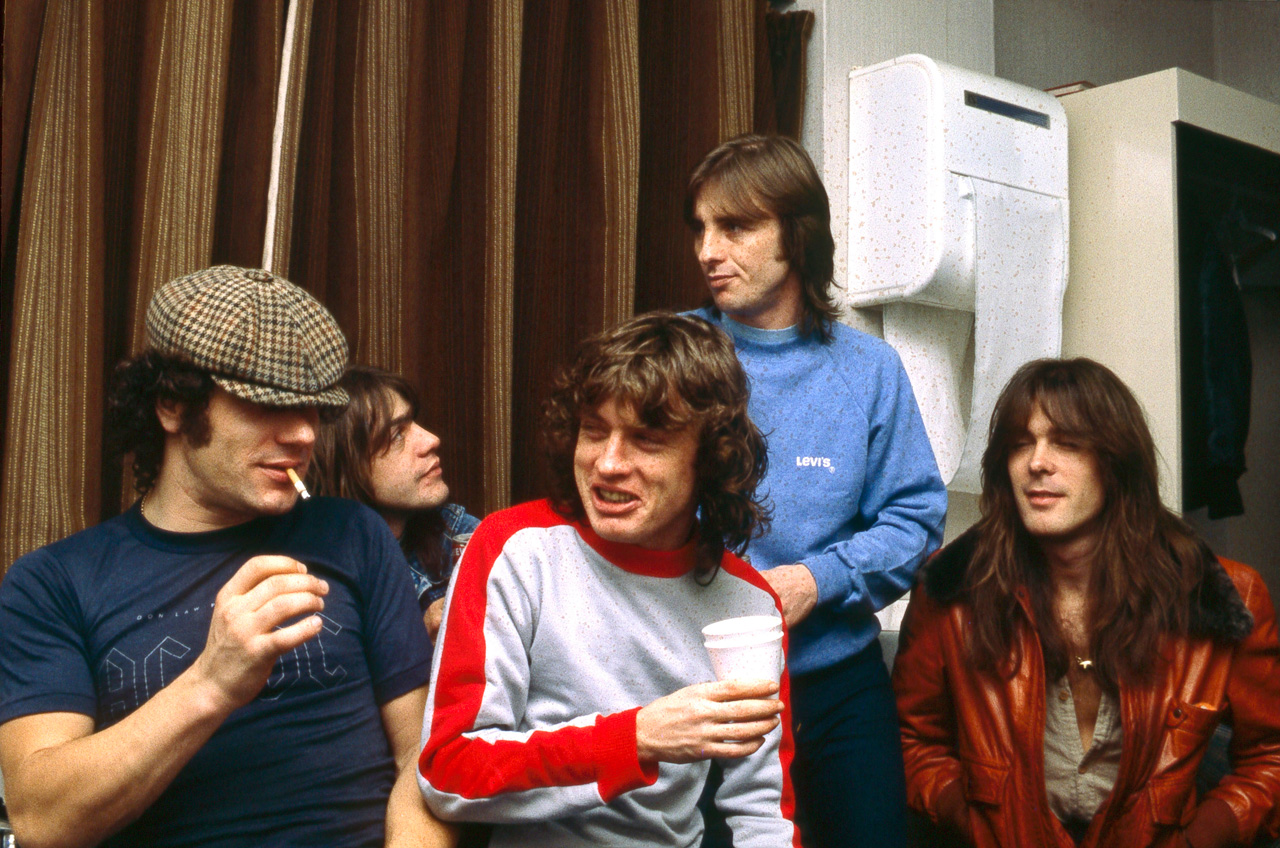
Even by AC/DC’s notoriously unsentimental standards, the statement that signalled the end of Brian Johnson’s 36-year tenure fronting the band was brutally blunt: “AC/DC are forced to reschedule the 10 upcoming dates on the U.S. leg of their “Rock or Bust” World Tour,” read the statement on the band’s website on March 7, 2016. “AC/DC’s lead singer, Brian Johnson, has been advised by doctors to stop touring immediately or risk total hearing loss. Tomorrow’s show in Atlanta through Madison Square Garden in New York, NY in early April will be made up later in the year, likely with a guest vocalist.”
The lack of a quote from Johnson, or any acknowledgement whatsoever of the singer’s contribution to the band across four decades, irked and offended many long-term fans, especially as it came after the outpouring of love offered to AC/DC in the aftermath of Malcolm Young’s retirement from the band in 2014 due to his dementia. It was left to Johnson himself to explain the situation and absolve his former bandmates of blame in a statement released the following month: “I had for a time become aware that my partial hearing loss was beginning to interfere with my performance on stage,” Johnson admitted. “I was having difficulty hearing the guitars on stage, and because I was not able to hear the other musicians clearly I feared the quality of my performance could be compromised. In all honesty, this was something I could not in good conscience allow.
“Our fans deserve my performance to be at the highest level, and if for any reason I can’t deliver that level of performance I will not disappoint our fans or embarrass the other members of AC/DC. I am not a quitter and I like to finish what I start. Nevertheless, the doctors made it clear to me and my bandmates that I had no choice but to stop performing on stage for the remaining shows and possibly beyond.
“Being part of AC/DC, making records and performing for the millions of devoted fans this past thirty-six years has been my life’s work,” Johnson said. “I cannot imagine going forward without being part of that, but for now I have no choice. The one thing for certain is that I will always be with AC/DC at every show in spirit, if not in person.”
Befitting the dignified, respectful manner in which Johnson has conducted his entire professional career, little has been heard from the 69-year-old singer since, save for the occasional pronouncement that he would love to return to fronting AC/DC, even as the band completed their Rock Or Bust world tour with Axl Rose subbing for Johnson with commendable humility and no little charm. As yet, however, there has been no indication that the door remains open for Johnson.
This month, though, he returns to the spotlight wearing a different cap – metaphorically, if quite possibly not literally – as a documentary host, fronting a new Sky TV series titled Brian Johnson’s Life On The Road. Having cut his teeth as a presenter in 2014 on Quest TV’s Cars That Rock With Brian Johnson, in the new series Johnson will conduct interviews about music, touring and the rock’n’roll lifestyle, with guests including The Who’s Roger Daltrey, Pink Floyd’s Nick Mason, Metallica drummer Lars Ulrich and fellow Geordie Sting, on whose 2013 album The Last Ship Johnson guested.
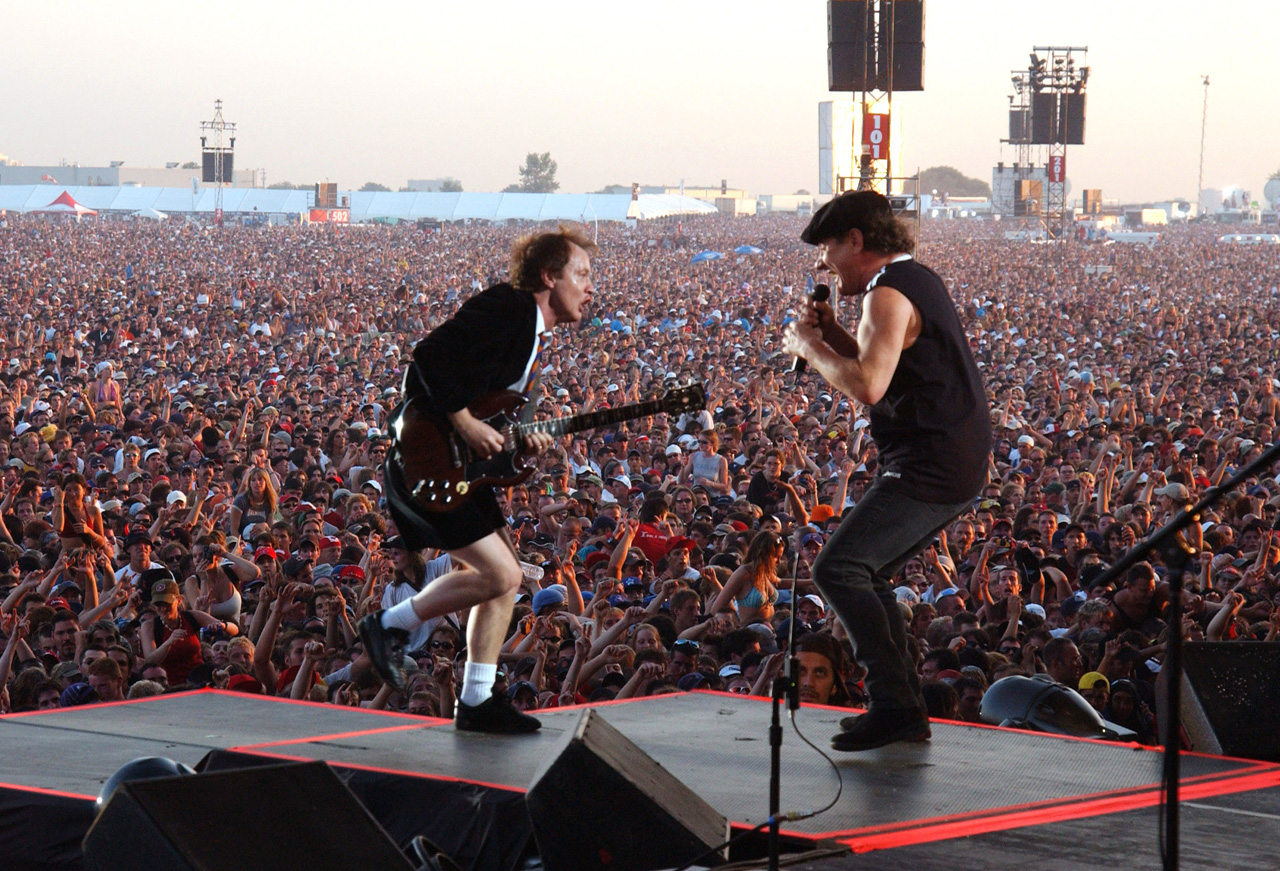
Although the programmes are structured in a conventional fashion, with archive footage and talking-heads comment spliced with Johnson’s affectionate, conversational one-on-one interviews, the format does lend itself to the intensely private Johnson sharing personal anecdotes too, whether reminiscing with Sting about both of them seeing Jimi Hendrix at Newcastle’s Club A GoGo in 1967, or telling Lars Ulrich that he used to check into hotels using the single-entendre pseudonyms Phil McCavity or Richard Hertz, aka Mr Dick Hurts. It’s actually quite sweet hearing Daltrey and Johnson reminisce excitedly about smuggling T-bone steaks wrapped in tin foil back to the UK from their first US tours purely so that their respective working-class families could marvel at the existence of such exotic fare.
As game as the interviewees invariably are, it’s Johnson’s blend of matey bonhomie, unbridled enthusiasm and salt-of-the-earth working-man attitude that makes the series shine, and it’s a rare and welcome opportunity to see the singer operating without the omertà code that has always kept outsiders at a distance from AC/DC. Not that you’ll hear Johnson spilling his guts about his time in the band, or airing any grievances he may harbour about his sudden exit – indeed the singer has been turning down promotional interviews for the series for fear of any quotes about his time in AC/DC being taken out of context – but his avuncular, easy manner lays him open in away one has rarely seen since Black In Black turned him and his new bandmates into the biggest rock band in the world.
And Back In Black unquestionably transformed Brian Johnson’s life. By his own admission, he was “scared shitless” when he was flown to Compass Point in the Bahamas for six weeks in the studio with golden-eared producer Robert ‘Mutt’ Lange, but his new colleagues never made him “feel like I was standing in a dead man’s shoes”, and Lange coaxed the performance of a lifetime from the singer.
The biggest-selling hard rock album in history wasn’t an immediate success. After assuring the new boy that the record was “fantastic” and was “gonna do the business”, Atlantic Records understandably panicked when the much-anticipated follow-up to the platinum-selling Highway To Hell entered the Billboard 200 at No.89 in August 1980. But by the following February it was in the US Top 10, where it would remain for almost six months. Johnson was almost comically unaffected by his arrival in the big time – when Sounds magazine covered AC/DC’s US arena tour, they found him cooking bacon and eggs in LA’s chic, upscale Sunset Marquis hotel, but seemingly wholly at ease with his new station in life.
“You know the first thing Angus and Malcolm said to me when I joined this band?” he asked journalist Sylvie Simmons. “They said: ‘Do you mind if your feelings ever get hurt?’ And I said: ‘Why?’ And they said: ‘Because if you’re going to join this band you’re going to be expected to take fucking stick. Because we’ve been slagged off by every fucking reporter since we left Australia.’ I said: ‘Well, I’m going to have to take stick anyway, taking this lad’s place.
“But we’re good in our field,” he continued. “We out and out just don’t give a fuck. We play what we play and that’s it. And the good thing is, no one else can do it as good as this band. This band’s the fucking best! Now and again I’ve forgotten I’m singing, and I just stop and watch that band, because I think they’re just fucking great. A great band and a great bunch of lads.”
Thirty-six years on, you won’t hear Brian Johnson giving a differing opinion of the band that now seem to have left him behind. But that should come as little surprise to fans of a man who has always been the most loyal, selfless and unaffected rock’n’roller, and is now a petrolhead multimillionaire who won’t even let race announcers mention his former day job for fear that it might make fellow drivers think him “an asshole”. If he never stands on a stage again, Brian Johnson’s place in rock history is assured. And you sense that the canny Geordie who has never forgotten his roots has made his peace with that.
“A lot of people up at my dad’s drinking club still look on me with a bit of pity,” Johnson once told an interviewer at the height of AC/DC’s fame. “They say: ‘Ee, poor fucker. Still hasn’t got a decent job.’ But I know I’m a lucky git.
“What would I do if I was sixteen again? Exactly the fucking same. I wouldn’t change a thing.”
Brian Johnson’s Life On The Road is on Sky Arts from 28 April at 9pm (subject to change).
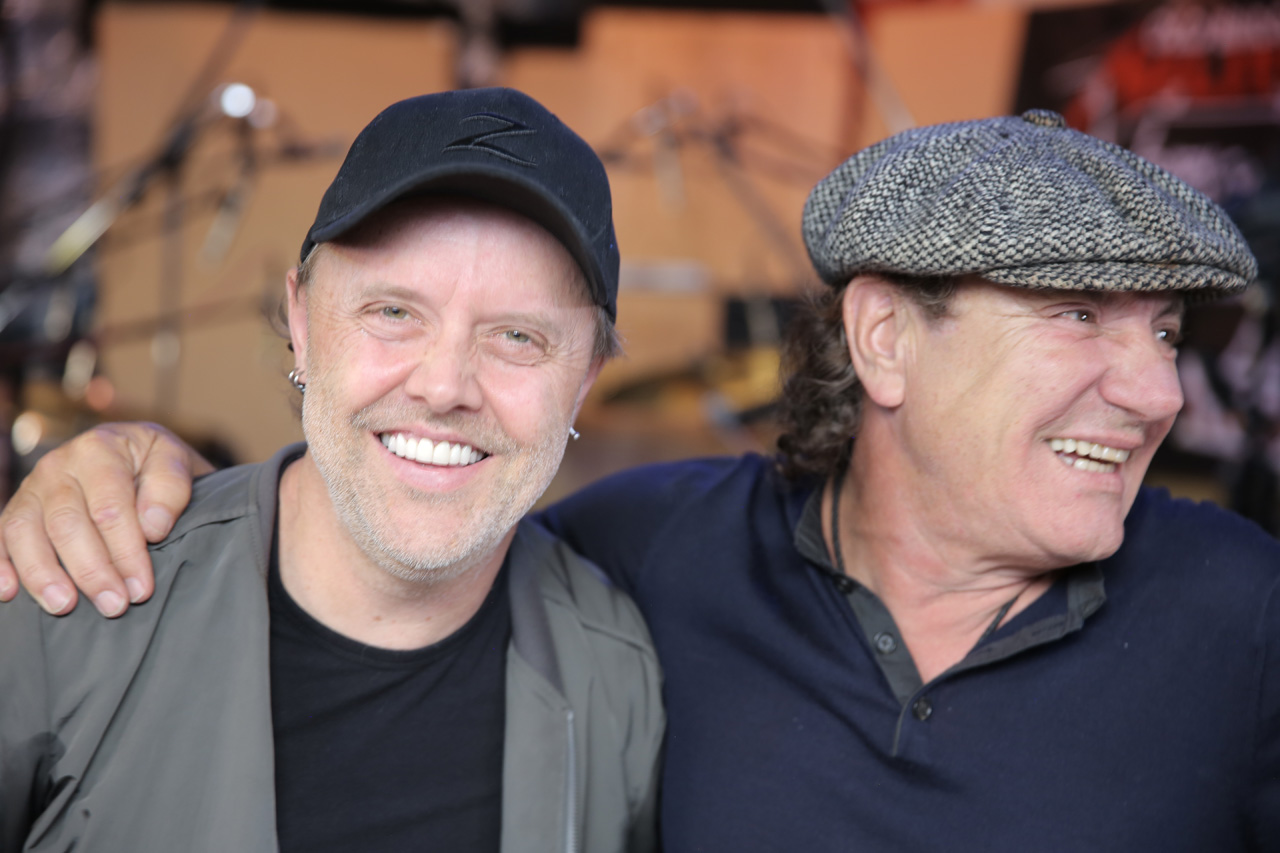
AC/DC’s Brian Johnson sings again
Even if Brian Johnson's hearing gets better – will AC/DC take him back?
